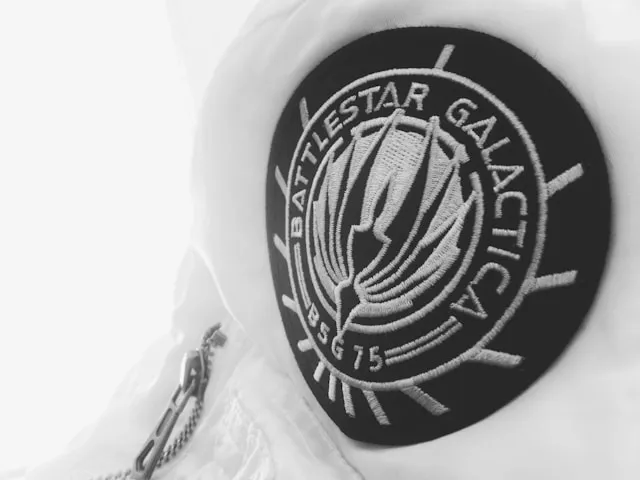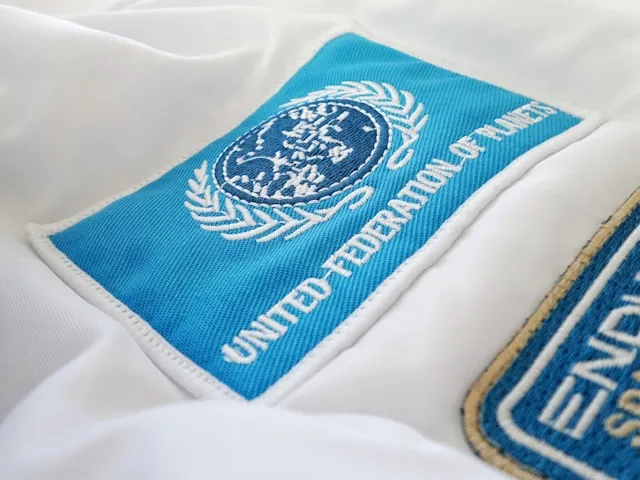How To Glue Patches To Fabric: Advice On Attaching Patches To Different Types Of Fabric & Best Gluing Products
When creating DIY fashion pieces and personalizing your clothes, gluing patches to fabric leads to a whole world of creative potential. It’s a solution to customize clothing, bags, accessories, and more, but you need to know how to glue patches on fabric. Popular materials include denim and leather, and this guide provides expert insights on choosing the right adhesive and techniques.
Glue patches onto various types of fabric and elevate your style game with our comprehensive tips and tricks.

Key Takeaways
- Gluing patches to fabric can be a good alternative to sewing or ironing patches on, with more versatility and durable bonds.
- Various patch types are compatible with fabric glue, but you need to carefully explore the specifics to get the right solution.
- Non-fabric glues may be usable in an emergency, but it is always best to use dedicated fabric glues for a permanent bond.
- Applying patches with fabric glue is a simple step-by-step process, but you should follow it carefully for best results.
- We supply high-quality patches made from various materials with plain or Pellon backings that are excellent for using fabric glue to attach to fabric.
How To Glue Patches To Fabric?
Gluing patches to fabric is a good alternative if you are not confident in sewing or lack the necessary equipment. Fabric glue can deliver a strong, durable bond that ensures your patches stay securely attached to the garments or accessories you choose. When you use fabric glue, you must take care to ensure the patches are made from materials compatible with adhesive bonding. Good choices include:
- Cotton
- PVC
- Nylon
Patches with smooth, non-porous surfaces are more likely to achieve an effective adhesion. Choose the plain or Pellon backing when ordering from us for good compatibility. It is similar to using a patch with an iron-on backing, wherein you activate the adhesive by applying heat. Whether you are embellishing a denim jacket, a polyester shirt, or any other form of apparel, fabric glue is a versatile solution that can help you add flair to your wardrobe. Just be sure to follow the manufacturer instructions to get the best possible results.

Can You Use Fabric Glue For Patches?
You can use fabric glue for attaching patches to apparel. It is compatible with an array of patch types, particularly if they have the right type of backing material. Here are some examples of patch materials that are compatible with fabric glue:
- Embroidered patches: With tight stitching, these patches can adhere well to other fabric with the right type of glue.
- Chenille patches: With their soft, textured appearance, these patches bond effectively with fabric glue due to their fabric-based construction.
- PVC patches: These are made from durable plastic, and they bond effectively with fabric glue, particularly when applied to non-porous surfaces.
Using fabric glue offers several benefits over sewing patches onto apparel. Let’s look at 3 distinct advantages of gluing patches to fabric:
- It eliminates the need for sewing skills or equipment, making it more accessible to beginners.
- Fabric glue provides a quicker application process that saves you time and effort.
- With fabric glue, you get a seamless, flat bond with no visible stitches for a clean, professional-looking finish.
Create customized embroidered patches to glue onto apparel
Our custom embroidered patches are manufactured with precision to match your design. Order with a plan backing and use your fabric glue to apply to your clothing.
Clothing Glue For All Fabrics, Nylon, Denim, Cotton, Flannel
When seeking a versatile fabric glue for how to glue patches on fabric, consider the following three factors:
- Compatibility: You should seek out a fabric glue designed to bond with a wide range of fabrics. The glue should be suitable for both porous and on-porous surfaces to accommodate the maximum number of materials.
- Strength: Look for strong bonding properties for gluing patches to fabric. You want the patch to remain attached even with regular wearing and washing. Check product labels for information on durability and washing.
- Drying time: Look for a fabric glue that dries quickly for efficient patch application. Some glues are quick-drying, while others may take longer to achieve optimal adhesion. Consider your needs and choose the appropriate glue.
Versatility is important when choosing a fabric glue that works on patches, so consider these factors carefully when making your choice.
Can You Use Any Type Of Glue On Fabric?
There are various types of glue that can adhere to fabric, but you can’t simply glue on patches with just any adhesive. Designated fabric glue will always deliver the best results as it provides a strong, flexible bond ideal for patch application.
Here are some common glue types to consider, and some insights into each:
- Hot glue guns: These can be effective, but they may leave unsightly residues on the fabric and create a stiff finish.
- Epoxy glues: These are durable, but they lack the flexibility for an ideal finish on fabric.
For gluing patches on fabric, stick with trusted fabric glue brands like Beacon, Dritz, and Gorilla. They offer a wide range of formulations that work for different fabrics and applications, so you are sure to find an option that works for you.
Considering Non-Fabric Adhesives For Emergency Repairs
In an emergency, you can apply a temporary fix to your patches with non-fabric adhesives like Gorilla Glue, super glue, and hot glue. You will need to understand how to remove the patch later to apply a proper adhesive, but they can be useful in a fix.
However, it’s important to understand the limitations of these solutions:
- Gorilla Glue: This is likely to stiffen the fabric and leave unsightly residues.
- Super glue: This can cause discoloration and will inevitably result in stiffness.
- Hot glue: This will lack flexibility and leave a visible residue.
You may also find that these glues are damaging to delicate fabrics. They may be an option for a quick fix if you really have no choice, but permanent repairs should be carried out with dedicated fabric glues.
What Is The Best Fabric Glue?
The best fabric glues for gluing on patches offer strength, versatility, and a reliable adhesion across a range of fabrics. Here are a few recommended products for you to consider:
- Aleene’s Original Tacky Glue: This is a popular choice that is known for creating strong bonds and being compatible with various fabrics like cotton, denim, and flannel.
- Beacon Fabri-Tac: A quick-drying glue with excellent washability.
- E6000 Fabric Fuse: Best reserved for heavy-duty projects, this adhesive provides exceptional strength and durability on natural and synthetic fabrics.
Consider these top choices for fabric glues for patches. Look closely at their strength, drying time, and washability for optimal results, whether you are buying from us or crafting your own patches.
How To Use Fabric Glue For Patches
You can use fabric glue for patches, but it’s important to know how for the best possible results. It’s a convenient alternative to sewing, so here’s a step-by-step guide to gluing patches to fabric:
- Prepare the fabric: The fabric needs to be clean and free of dust and debris, and you should lay it on a flat surface.
- Position the patch: Carefully align the patch exactly where you want it to go, ensuring it is centered.
- Apply the glue: Squeeze a little bit of the fabric glue onto the back of the patch. You can spread it evenly across the patch backing with a toothpick or small brush.
- Press firmly: Apply the patch to the fabric and push down firmly, ensuring good contact and following the adhesive’s instructions.
- Let it dry: Follow manufacturer guidance on drying times to get the optimal adhesion.
- Reinforce if needed: You may want to apply extra adhesive to the edges of the patch to provide extra durability.
By following these steps for how to glue on patches, you can achieve a strong, long-lasting bond.

What Is The Correct Way To Apply Patches With Fabric Glue?
The key to applying patches with fabric glue is to follow the process outlined above. But one key consideration is achieving an even distribution of the fabric adhesive and not using too much. Here are some tips:
- Use a toothpick or small brush to apply a thin, even layer of fabric onto the patch backing.
- Start with a small amount of glue and add more as you need it to avoid excess.
- Aim for an even spread over the entire surface of the patch packing, all the way to the edges.
- Don’t take too long spreading the adhesive if it has a quick-drying formula.
We supply an array of patch materials that you can customize to create patches suitable for gluing onto fabric. These include embroidered, PVC, chenille, and custom leather patches, all of which are crafted to the highest standards and featuring your personalized designs.
Preparing Fabric And Patches For Gluing
Before you use fabric glue for patches, you must prepare both the fabric and the patches properly. You need to provide a clean canvas for the patch to adhere effectively. The key to this is to ensure the fabric surface is clean and free of any dust, dirt, and wrinkles. Lay it out flat and make sure the back of the patch is also free of debris or loose threads that might hinder adhesion.
Adequate preparation of both surfaces creates the optimal conditions for a strong, durable bond with fabric glue.
How To Speed Up The Drying Process
It may be possible to speed up the drying process to glue on patches to fabric quickly. Here are a few tips to help the glue dry swiftly without compromising the bond:
- Ensure the room is well-ventilated and kept at a moderate temperature.
- Apply pressure to the patch after applying the glue to remove excess and promote faster drying.
- You may be able to use a hair dryer on a low heat setting to gently blow warm air over the glued area, but be cautious with this.
In most cases, the product instructions will provide guidance on how to get the optimal adhesion. We recommend following those instructions for the best possible results.
Pre-Treating Fabrics For Better Adhesion
Pre-treating fabrics can be helpful when considering how to glue patches on fabric. The most important step is to clean the fabric to ensure it is clear of dirt, oils, or residues that may inhibit adhesion. Here are some tips:
- Use a gentle detergent and cold water for delicate fabrics, or machine washing for sturdier fabrics.
- Avoid fabric softeners or dryer sheets as these can leave residues that hinder adhesion.
- After cleaning, iron the fabric to remove wrinkles and ensure a smooth gluing surface.
For some fabric glues, there are fabric stiffeners or primers that you could use to pretreat the fabric for a stronger adhesion. Explore these options to get the best possible bond between the patch and the fabric.
Layering Techniques: Gluing Multiple Patches For Visual Impact
In 2025-26, layered patch applications are gaining popularity for DIY apparel customization. You can glue one patch slightly over another to create a sense of dimension or contrast - thai is an ideal strategy for statement pieces like denim jackets or tote bags.
When you are layering patches, glue the bottom patch first and allow it to dry fully before adding the top ones. Here are a couple of other tips:
- Use thinner fabric glue layers on the upper patch to avoid build-up.
- Consider combining different textures (such as embroidered over chenille) or shapes to achieve a collage-like effect.
With this approach, you have a creative way to tell a story or showcase multiple design elements on a single garment.
Design unique, stylish leather patches to apply with glue
Whether for clothing, accessories, or anything else, our custom leather patches offer flexible personalization and the option to glue in place for a robust attachment.
Create your designHow To Solve Problems When Applying Patches To Fabric?
There are various common problems you may encounter when using fabric glue on patches: Here are some solutions to the main issues you may encounter:
- Glue doesn’t dry fast enough: Place in a well-ventilated area and consider using a hair dryer on a low setting.
- Glue leaves marks on fabric: Test the glue on an inconspicuous area first, and apply it sparingly with even distribution on the back of the patch.
- Glue doesn’t hold the patch properly: You must ensure the fabric and patch surfaces are clean and dry before application. A stronger adhesive or stitching may be needed.
- Glue stiffens the fabric: You need a fabric glue formulated to maintain fabric flexibility. Test it first on a scrap of fabric.
- Glue creates air pockets: Ensure the fabric and patch are smoothed out before applying adhesive. A roller or credit card may be helpful to press out air pockets before the glue dries.

Advantages Of Using Fabric Glue Over Iron-On Patches
Iron-on patches are a common choice, and we supply high-quality custom ones for you to design yourself. But fabric glue can offer various advantages over heat-application patches in certain scenarios:
- Fabric glue is more versatile, suitable for a wider range of fabrics including delicate and stretchy materials that can't withstand the heat of an iron.
- The bond from fabric glue is often more permanent and durable than iron-on patches, particularly in high-stress areas like elbows or knees.
- Fabric glue is easier with intricate designs or small patches that would otherwise require precise heat application.
Overall, fabric glue is convenient and reliable for putting patches on fabric.
Consider an convenient alternative to gluing patches to fabric
Our custom iron-on patches allow the samne diverse material and customization options, but the convenient iron-on backing makes it easy to achieve a robust attachment.
Frequently Asked Questions About Gluing Patches To Fabric
How To Glue Patches To Fabric?
To glue patches onto fabric, you must ensure the fabric and patch are clean and dry, and placed on a flat surface. Apply glue all over the back of the patch, press onto the fabric, and follow the product instructions for drying times.
Can You Use Any Type Of Glue On Fabric?
Different fabric glues are suitable for different types of fabrics. Look carefully at the glue’s instructions to see what fabrics it is suitable for to find the right solution for your needs.